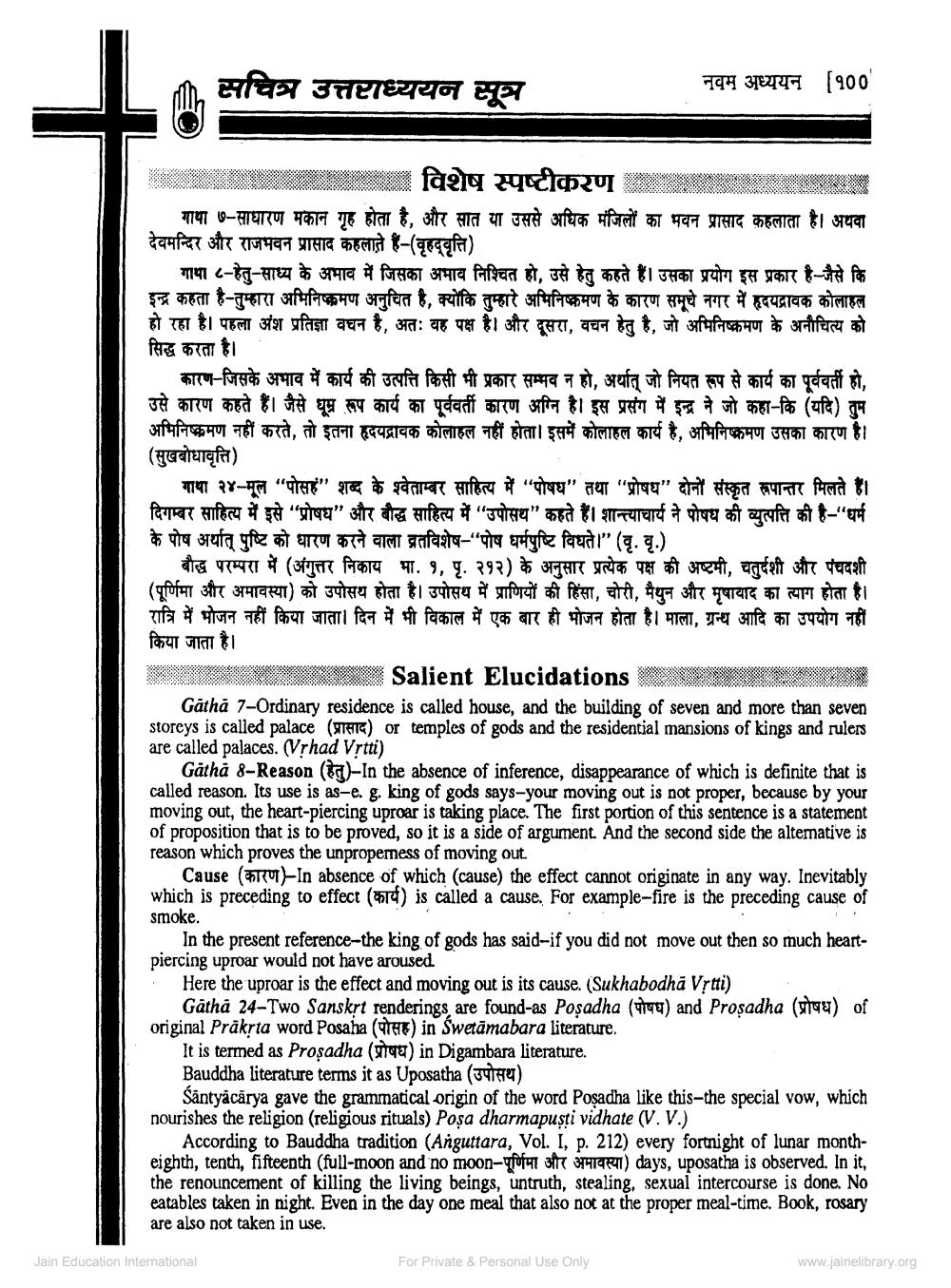________________
सचित्र उत्तराध्ययन सूत्र
विशेष स्पष्टीकरण
गाथा - साधारण मकान गृह होता है, और सात या उससे अधिक मंजिलों का भवन प्रासाद कहलाता है अथवा देवमन्दिर और राजभवन प्रासाद कहलाते हैं - ( वृहद्वृत्ति)
नवम् अध्ययन [ १००'
गाथा ८-हेतु-साध्य के अभाव में जिसका अभाव निश्चित हो, उसे हेतु कहते हैं। उसका प्रयोग इस प्रकार है-जैसे कि इन्द्र कहता है तुम्हारा अभिनिष्क्रमण अनुचित है, क्योंकि तुम्हारे अभिनिष्क्रमण के कारण समूचे नगर में हृदयद्रावक कोलाहल हो रहा है। पहला अंश प्रतिज्ञा वचन है, अतः यह पक्ष है और दूसरा, वचन हेतु है, जो अभिनिष्क्रमण के अनौचित्य को सिद्ध करता है।
कारण- जिसके अभाव में कार्य की उत्पत्ति किसी भी प्रकार सम्भव न हो, अर्थात् जो नियत रूप से कार्य का पूर्ववर्ती हो, उसे कारण कहते हैं। जैसे धूम्र रूप कार्य का पूर्ववर्ती कारण अग्नि है। इस प्रसंग में इन्द्र ने जो कहा कि (यदि ) तुम अभिनिष्क्रमण नहीं करते, तो इतना हृदयद्रावक कोलाहल नहीं होता। इसमें कोलाहल कार्य है, अभिनिष्क्रमण उसका कारण है। ( सुखबोधावृत्ति)
गाथा २४ - मूल " पोसह " शब्द के श्वेताम्बर साहित्य में "पोषध" तथा "प्रोषध" दोनों संस्कृत रूपान्तर मिलते हैं। दिगम्बर साहित्य में इसे "प्रोषध" और बौद्ध साहित्य में "उपोसथ" कहते हैं शान्त्वाचार्य ने पोषध की व्युत्पत्ति की है धर्म के पोष अर्थात् पुष्टि को धारण करने वाला व्रतविशेष- "पोष धर्मपुष्टि विधते ।” (वृ. वृ.)
बौद्ध परम्परा में (अंगुत्तर निकाय भा. १, पृ. २१२ ) के अनुसार प्रत्येक पक्ष की अष्टमी, चतुर्दशी और पंचदशी (पूर्णिमा और अमावस्या) को उपोसथ होता है। उपोसथ में प्राणियों की हिंसा, चोरी, मैथुन और मृषावाद का त्याग होता है। रात्रि में भोजन नहीं किया जाता। दिन में भी विकाल में एक बार ही भोजन होता है। माला, ग्रन्थ आदि का उपयोग नहीं किया जाता है।
Salient Elucidations
Gatha 7-Ordinary residence is called house, and the building of seven and more than seven storeys is called palace () or temples of gods and the residential mansions of kings and rulers are called palaces. (Vrhad Vriti)
Gatha 8-Reason ()-In the absence of inference, disappearance of which is definite that is called reason. Its use is as-e. g. king of gods says-your moving out is not proper, because by your moving out, the heart-piercing uproar is taking place. The first portion of this sentence is a statement of proposition that is to be proved, so it is a side of argument. And the second side the alternative is reason which proves the unpropemess of moving out.
Cause ( कारण ) - In absence of which (cause) the effect cannot originate in any way. Inevitably which is preceding to effect (rd) is called a cause. For example-fire is the preceding cause of smoke.
In the present reference-the king of gods has said-if you did not move out then so much heartpiercing uproar would not have aroused
Here the uproar is the effect and moving out is its cause. (Sukhabodha Vṛtti)
Gatha 24 Two Sanskrt renderings are found as Poşadha ( पोषय) and Prosadha (प्रोषध) of original Prakrta word Posaha (पोसह) in Swetāmabara literature.
Jain Education International
It is termed as Proşadha (प्रोषध) in Digambara literature.
Bauddha literature terms it as Uposatha (उपोसथ )
Säntyäcārya gave the grammatical origin of the word Posadha like this-the special vow, which nourishes the religion (religious rituals) Posa dharmapusti vidhate (V. V. )
According to Bauddha tradition (Anguttara, Vol. I. p. 212) every fortnight of lunar montheighth, tenth, fifteenth (full moon and no moon पूर्णिमा और अमावस्या) days, uposatha is observed. In it, the renouncement of killing the living beings, untruth, stealing, sexual intercourse is done. No eatables taken in night. Even in the day one meal that also not at the proper meal-time. Book, rosary are also not taken in use.
For Private & Personal Use Only
www.jainelibrary.org




